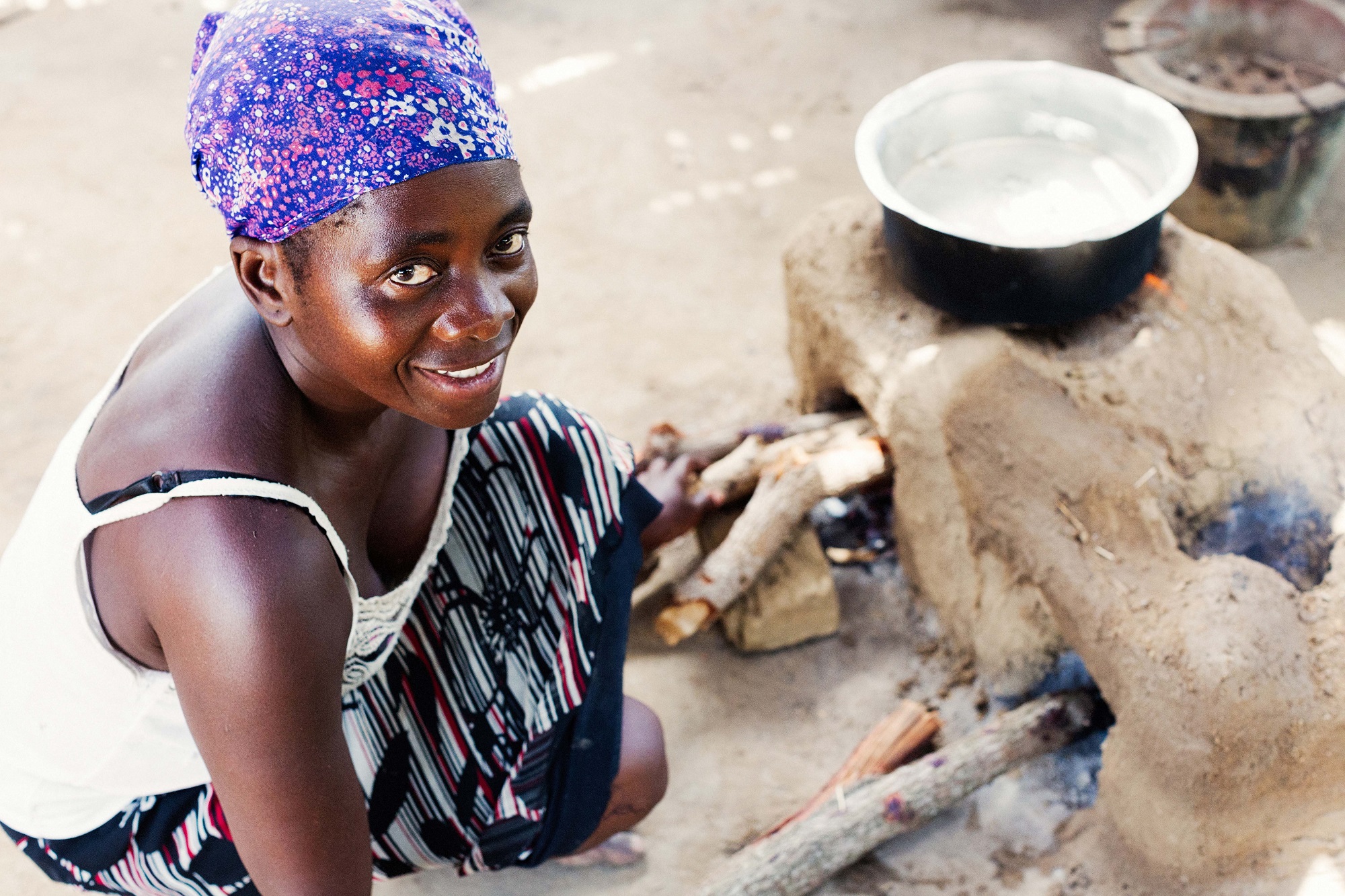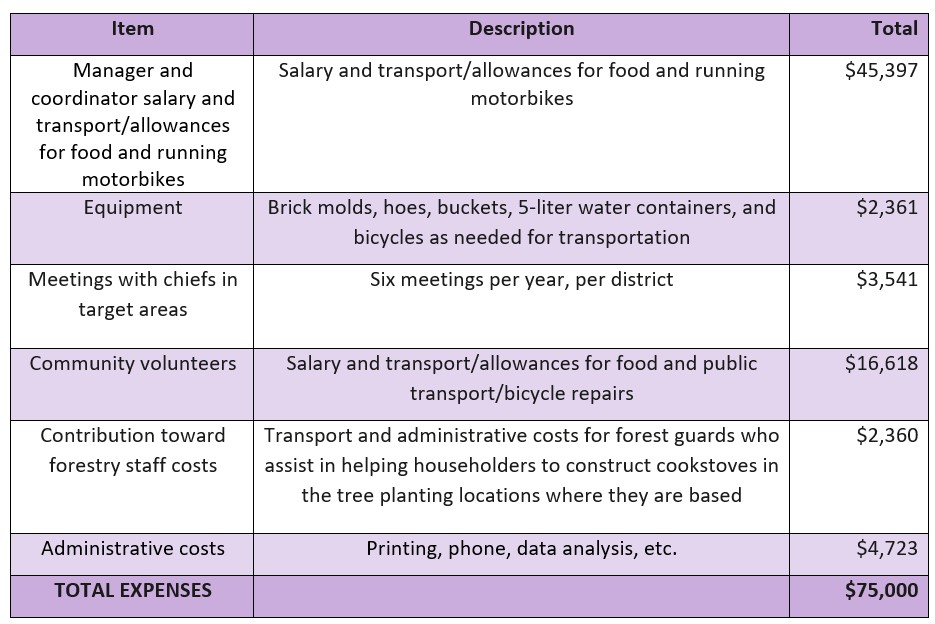
Project Title: Changu Changu Moto Project
Location: Malawi
Project Summary: Since its humble beginnings in rural Malawi in 2003, RIPPLE Africa has stayed true to its mission of empowering communities to invest in a sustainable future. All their projects have been guided by the needs, voices, and input from the local communities. Today, RIPPLE Africa works on three main issues: education, healthcare, and the environment, and it serves a population of 325,000 people.
As social norms in Malawi dictate, women are largely responsible for overseeing the household, including cooking, cleaning, childcare, fuel-wood collection, and managing family finances. This gender-based division of labor makes women especially vulnerable to the negative health implications of daily cooking over traditional three-stone fires which are inefficient, unhealthy, and dangerous. Included in this high-risk group are the children, especially those under age five, because of their close proximity to the open fires while under their mother’s care. Women and their children develop respiratory illnesses associated with breathing in massive amounts of smoke on a daily basis, and exposure to burns pose additional health risks due to the open flame of the fire. Collection of firewood is a labor-intensive and time intensive process and sometimes fraught with safety risks as women have to go farther and farther away from home in search of firewood.
The Changu Changu Moto (CCM) cook stove has the ability to transform the way women in rural Malawi cook, ultimately protecting the environment, saving lives, improving economic wellbeing, and empowering women. Due to the stove’s reduced need for firewood, decreased smoke production and incidence of burns, and effectiveness in cooking food quickly, adoption by the women has been quick and easy. Since its introduction in 2011, 43,000 CCM cook stoves have been adopted by Malawian women. Dining for Women awarded a $45,000 Featured Grant to RIPPLE Africa in May 2015. These funds helped build 3,000 of those efficient cook stoves for 3,000 families in Mzuzu, Malawi.
For this Sustained Grant, RIPPLE Africa will bring the CCM cook stove to 5,743 households in Nkhotakota and Mzimba Districts of Malawi. This simple, low-tech, fuel-efficient stove is constructed from mud bricks made from locally-sourced materials that are free and readily available. There is no expensive equipment needed for construction, making this a cost-effective solution suited to rural Malawian households. In addition, each woman receiving a cookstove is involved as an active participant. RIPPLE Africa CCM project staff meet with each householder to discuss the rationale for the project and work alongside them to construct the stove as equals. Women receiving the cookstoves are also trained in its maintenance and upkeep. Since women are involved from beginning to end, it helps ensure a sense of pride and ownership of the stove and empowers them with the ability to maintain it ongoing. This process has proven to be a key element leading to the overwhelming success of the CCM project as a viable replacement for the three-stone fire option. Furthermore, with the time saving that women and girls experience after the adoption of the cookstoves, they are able to pursue education and income-generating opportunities.
Impact: This project will have a direct impact on 14,358 women and girls and will indirectly impact an additional 14,358 family members over the three-year period.

Why we love this project: We love that RIPPLE Africa is addressing Malawi’s growing population and heavy dependence on wood for cooking fuel. This dependence is destroying the environment with deforestation taking place at an alarming rate and has widespread implications, including climate changes and a reduction in rainfall. By eliciting the cooperation of women to move to more efficient cook stoves that use less firewood and emit less smoke, these women and their families experience health benefits and they have more time for productive economic activity. Furthermore, from an environmental perspective, the significant reduction in wood use across 5,743 households has positive effects for entire communities and the natural environment on which people of all ages live and depend.
Sustainable Development Goals:
![]()
![]()
![]()
![]()
![]()
![]()
![]()
![]()
![]()
![]()
2015 Featured Grant Info
Project Title: Changu Changu Moto Project
Location: Malawi
Grant Amount: $45,000
Grantee Website: www.rippleafrica.org/
Areas of Impact: Economic Sustainability, Education & Literacy, Health
Mission of RIPPLE Africa: Featured (2015), Sustained (2019-2021)
The mission of RIPPLE Africa is to improve the standard of education and healthcare; preserve and sustainably develop the environment; and create opportunities for the local communities in the Nkhata Bay District of Malawi.
Summary
In Malawi, 95 percent of the population relies on wood or charcoal for cooking, and almost exclusively, those responsible for cooking and obtaining the wood for fuel are women. Cooking on inefficient traditional open fires daily has serious repercussions for women’s lives related to health, safety, economic circumstance, as well as the destruction of the natural environment on which millions of Malawian women depend. A fuel-efficient cook stove called the Changu Changu Moto provides a simple and culturally appropriate alternative to traditional cooking methods. A grant of $45,000 from Dining for Women will support the construction of 3,000 Changu Changu Moto stoves in the northern part of Nkhotakota, Malawi, directly benefitting 3,000 women and an estimated 4,500 girls.
RIPPLE Africa’s Changu Changu Moto project combats many of the issues resulting from daily use of a traditional open fire. This low-tech, 100 percent sustainable fuel-efficient cook stove model provides a 66 percent wood savings and produces less smoke, thus delivering positive outcomes for women in the areas of health, labor, safety, economic circumstance, and the natural environment.
Why We Love This
This is an interesting idea using locally sourced materials. Participants put in sweat equity, and manufacture the bricks and construct the stoves themselves. The stoves are well designed, safe and most importantly reduce the time woman and girls spend gathering firewood. Needing less firewood also reduces the risks women and girls expose themselves to as they walk lengthy distances for firewood. The reduction in smoke benefits the health of the entire family.
Location Map
